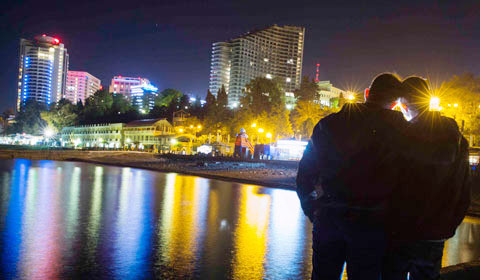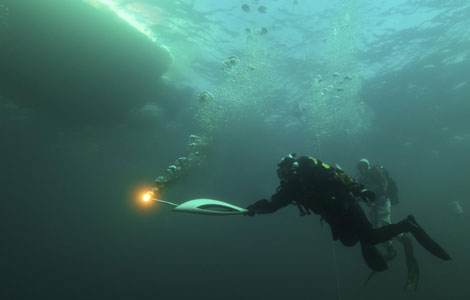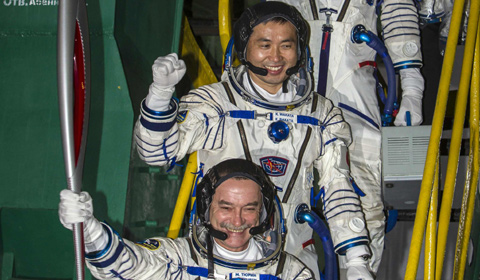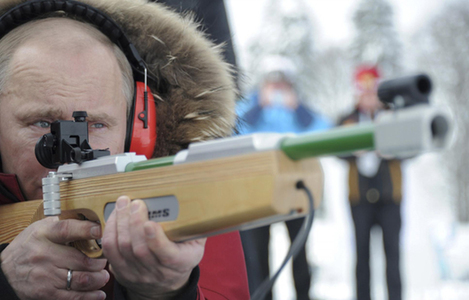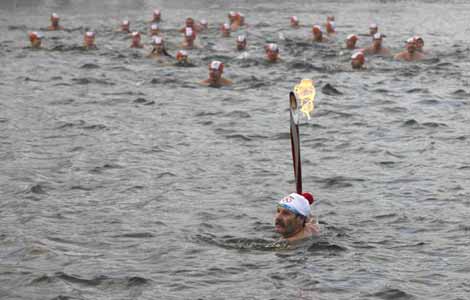
Tough drug-testing net in place for Sochi Olympics
Updated: 2014-01-29 21:59:55
( Agencies)
LONDON (AP) _ Go ahead _ just try to get away with it. If you're willing to take the risk, you'll pay the price.
That's the challenge laid down to drug cheats thinking they can dope their way to success at the Winter Olympics in Sochi.
International Olympic and anti-doping officials are implementing the toughest drug-testing program in Winter Games history, using intelligence to target athletes and events considered most at risk.
Authorities are focusing their efforts on weeding out dopers through rigorous pre-games and pre-competition tests. Armed with an improved scientific method that can detect drug use going back months rather than days, the International Olympic Committee will conduct a record number of tests.
Urine and blood samples will be stored for eight years for retroactive testing, providing further deterrence to anyone thinking they can avoid being caught.
``I think it would be stupid to try to cheat,'' IOC medical director Dr. Richard Budgett told The Associated Press. ``If there are any doping cases in Sochi, some of them may be because athletes are being stupid.''
The Russian doping lab, which had faced possible suspension by the World Anti-Doping Agency for inadequate procedures, has been fully accredited for the games and will be analyzing samples around the clock.
The Winter Olympics have produced only a small number of positive tests over the years as they involve far fewer athletes than the Summer Games and fewer sports with a record of doping.
Olympic officials hope any cheats will have been screened out already through extensive out-of-competition testing carried out around the globe in the months, weeks and days leading up to the games.
Don't think, though, that nobody's cheating or that Sochi will be doping-free.
``You'd be foolish to write off the Winter Games as having any lesser risk,'' said Andy Parkinson, chief executive of Britain's national anti-doping agency.
The IOC plans to carry out 2,453 tests in Sochi, including 1,269 pre-competition controls. That's a 57 percent increase in pre-games tests from the 2010 Winter Games in Vancouver.
The majority of the 1,184 in-competition tests will be done in sports like cross-country skiing and biathlon, endurance events with a history of blood doping and EPO use. About 20 percent of the doping controls will be blood tests.
Much of the testing will be based on intelligence gathered from law-enforcement agencies, whistle-blowers and previous suspicious blood level results.
The testing program begins on Jan. 30, the day the athletes village opens. From then until the close of the games on Feb. 23, Olympic athletes can be tested at any time and at any place, including training sites anywhere in the world. The games open on Feb. 7.
About 2,000 of the 3,000 athletes competing in Sochi are expected to be tested _ some of them two, three or even four times. The top five in all medal events are tested, as well as others chosen at random.
Since testing began at the Winter Olympics in 1968, only 20 doping cases have been reported by the IOC. In Vancouver, two hockey players were reprimanded for minor violations after testing positive for stimulants.
There was one positive test during the 2006 Turin Games, with Russian biathlete Olga Pyleva stripped of a silver medal.
However, there was a wider doping scandal in Turin. Acting on a tipoff from the IOC, Italian police raided the lodgings of the Austrian cross-country and biathlon team, seizing blood doping equipment. While no Austrians tested positive at the time, four later received life bans from the IOC.
The IOC freezes and stores Olympic samples for eight years at the lab in Lausanne, Switzerland. The samples can be retested when new methods become available. The storage period will be extended to 10 years starting in 2016.
The IOC recently retested 350 samples from the Turin Olympics, but said it will wait until after the Sochi Games to announce the results.
``The rules from Torino say the IOC cannot discuss any details about that until the full doping control process is completed, and it's not completed yet,'' Budgett said. ``What we can say is that it doesn't affect any athletes who are competing in Sochi.''
While testing has improved, there remains a loophole in the system: no reliable test exists for detecting the transfusion of an athlete's own blood. Several sports federations, however, have adopted the ``biological passport'' program, which monitors an athlete's blood parameters over time to detect changes that could indicate doping.
The Olympics come at a sensitive time for Russia, which has a dubious record on doping. Scores of Russian athletes in various sports have tested positive in recent months. A scandal in Sochi would be a huge embarrassment for the host country.
Russia's doping lab has also come under scrutiny, with WADA threatening to suspend the Moscow-based facility late last year unless it improved its procedures. The lab has since passed inspection and has set up a satellite facility in Sochi for the Olympics.
The lab will be staffed by 90 personnel, including 18 international experts appointed by the IOC to help oversee the operations.
The main novelty is the ``long-term metabolite'' test for steroids, expanding the detection window by weeks or months. The WADA lab in Cologne, Germany, has found hundreds of positive cases with the new test in the past year.
Also in use will be tests for human growth hormone, which had been on hold following challenges to the system for measuring blood limits.
``You can't say there are no cheats,'' WADA director general David Howman said. ``People are having a go where they can, but the risk is heightening and the approach is better.
``We keep saying: `You'd be stupid if you tried to cheat at the Olympics because you're going to be found out.'''
Follow Stephen Wilson on Twitter: http://twitter.com/stevewilsonap
__
AP Sports Writer John Leicester in Paris contributed to this report.
Photo Gallery
China Daily in Sochi

High stakes for Putin at costly Sochi Games
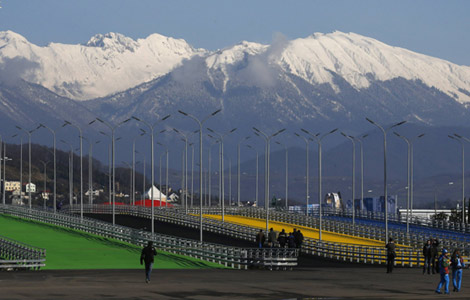
China to send 66 athletes for Sochi Winter Games
Medal Count |
||||
|
1
|
|
1 | 2 | 3 |
|
2
|
|
1 | 2 | 3 |
|
3
|
|
1 | 2 | 3 |
|
4
|
|
1 | 2 | 3 |
|
5
|
|
1 | 2 | 3 |
|
6
|
|
1 | 2 | 3 |
